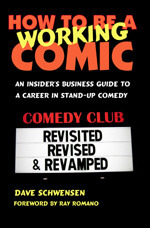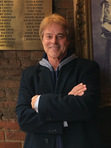Record for your own protection
Hi Dave – In case you missed it, here’s a story you might want to discuss in the newsletter. The Supreme Court of British Columbia upheld the right of a bar patron to receive five-figures in damages from a comedian whose performance she alleges gave her post-traumatic stress disorder. You can view full article at THIS LINK.
We were taught to record every set – mainly so we could hear which jokes worked and how well – but also to document what was actually said. The example we were given was a case of a comic being accused of using inappropriate language in a mandatory “clean” show… – BM
Hey BM – Thanks for sending a link for the above story. I’m sure most of the comedy community knows about this, but if not you should check it out.
I’ve heard too often from comics and bookers that comedy clubs were The Last Bastion of Free Speech. In other words, as long as you’re funny it’s okay to have an opinion and not worry about being politically correct. Of course there are limits – call them going over the edge of edginess. If you don’t believe me, ask Michael Richards, Gilbert Gottfried and Tracy Morgan to name a few who took an unexpected journey into this Land Of Bad Press.
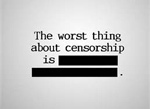 For me to comment on the linked article would turn this version of FAQs and Answers into a soapbox for my opinions. Believe me, I have them and they should be obvious. Being involved in this laughter biz for as long as I have should make my views very clear. I wouldn’t have stuck around if I was easily offended.
For me to comment on the linked article would turn this version of FAQs and Answers into a soapbox for my opinions. Believe me, I have them and they should be obvious. Being involved in this laughter biz for as long as I have should make my views very clear. I wouldn’t have stuck around if I was easily offended.
Then again, I’ll share an opinion at the end of this article…
You also brought up the subject of recording your set – every set – so you can hear what works and what doesn’t. Since I’m a coach who believes you can’t teach comedy – sorry, there are no formulas or you’d all be telling jokes in the same style – the only way to find out what works or doesn’t is to do it in front of a live audience.
The audience is your teacher. If your performance is funny – the majority will laugh. If it sucks, you’ll hear crickets from the segments of the room where your family and friends are not sitting.
So the best way to learn this? Record your sets – every time. Listen and critique.
Did they laugh? Why?
Did they NOT laugh? Why – and can you fix it?
And for those of you who need a formula – that’s it.
You also brought up the importance of recording your set as a way to “document” what is said onstage. I don’t emphasize that as much as the writing benefits in my workshops, but it can serve an important purpose.
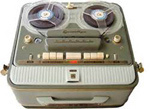 Some performers may not realize this, but did you know quite a few club owners or managers video (or audio) tape the shows? It’s nothing new. Okay – maybe the video is newer if you count the last 20 years as “recent.” Before that a lot of them at least had an audio recorder going.
Some performers may not realize this, but did you know quite a few club owners or managers video (or audio) tape the shows? It’s nothing new. Okay – maybe the video is newer if you count the last 20 years as “recent.” Before that a lot of them at least had an audio recorder going.
I know. I’ve been around since the audio recorder days and saw them.
I’ve also seen this “documentation” (proof) used to show performers that what they advertised (promised) was not what they delivered. And in some cases, it justified the talent booker not paying the act.
Example…
This past winter I received a call from a booker to warn me about a certain comedian who was promoting himself as a clean (G-Rated) act. He had booked him for a corporate show and was called-out by the client because the comic not only talked about sex – but also dropped the F-bomb in the process.
Are you kidding me? There are performers that dumb still getting hired? Unfortunately, yeah – simply because they misrepresent themselves and don’t back it up.
Of course the comic protested because he was now out of some big corporate show $$’s that he had planned on banking. He said his material was not that dirty.
So the booker told him to prove it. Send the audio or video. The comic couldn’t because he didn’t record it. So it came down to the client’s word vs. the comic’s word.
Can you guess who won? Yeah, the one with the big corporate $$’s to spend on their next event. All the comic received was a bad-mouthing as the talent booker called other talent bookers to warn them of the potential nightmare.
———————————————————————————
Sign up now for Dave’s free weekly newsletter and
receive 15% off the Amazon.com list price!
———————————————————————————
So now getting back to the article linked above (“Slurs force comic to pay $15,000 for ‘tirade of ugly words’ against lesbian patron after appeal falls flat”) it sounds like it came down to a big war of words. When the dust settled, the judge made a ruling based on whose lawyer sounded most convincing.
But did the comedian record his set? I never read anything in the article that said he did – which might (or might not) have saved him time, trouble and $$$’s. I side with him and believe in our right to free speech – but within certain limits.
What do I mean by that stipulation?
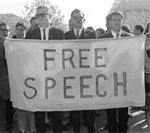 A comedy club normally is for patrons aged 21 and over. If you can’t take the heat – get out. It’s like watching television. If I don’t like something I change the channel – but don’t impose my beliefs on someone else who might enjoy it. As examples I’ll use all the murder / detective shows on prime time that I can’t stand. But they pull high ratings, so who am I to prevent others from watching?
A comedy club normally is for patrons aged 21 and over. If you can’t take the heat – get out. It’s like watching television. If I don’t like something I change the channel – but don’t impose my beliefs on someone else who might enjoy it. As examples I’ll use all the murder / detective shows on prime time that I can’t stand. But they pull high ratings, so who am I to prevent others from watching?
Instead, I’ll just change the channel to The Voice or a rerun of Seinfeld. Got it?
On the other hand, many years ago I took my 5 year old son to a very well-known amusement park. It wasn’t Disney because they have standards about this stuff. But as we walked around I saw a guy wearing a white t-shirt with the F-Bomb actually spelled out in all it’s four-letter glory in bold black lettering as in “F(bomb) YOU!”
Sorry cowboy – but not the time or place for your political incorrectness. Performers who work in the comedy (and speaking) biz will understand. It’s called knowing your audience and the audience this idiot had was a 5-year old kid with his parents.
This goes both ways. Performers – know your audience. Audience – realize where you are. If it’s a corporate show – it’ll be clean. If it’s a comedy club – chances are something will be said that’s not appropriate for 5 year old kids.
When you cross the line, that’s when the trouble – and bad-mouthing phone calls – can start. The best defense? Always record your set and be sure it backs up what you’ve been hired to do.
———————————
Dave’s next comedy workshop at The Cleveland Improv starts Saturday – July 13, 2013
Dave Schwensen is the author of How To Be A Working Comic: An Insider’s Business Guide To A Career In Stand-Up Comedy, Comedy FAQs And Answers: How The Stand-Up Biz Really Works, and Comedy Workshop: Creating & Writing Comedy Material for Comedians & Humorous Speakers.
For information about these books, comedy workshops at The Cleveland Improv, and private coaching for comedians and speakers in person, by phone or via Skype visit www.TheComedyBook.com
Copyright 2013 – North Shore Publishing



